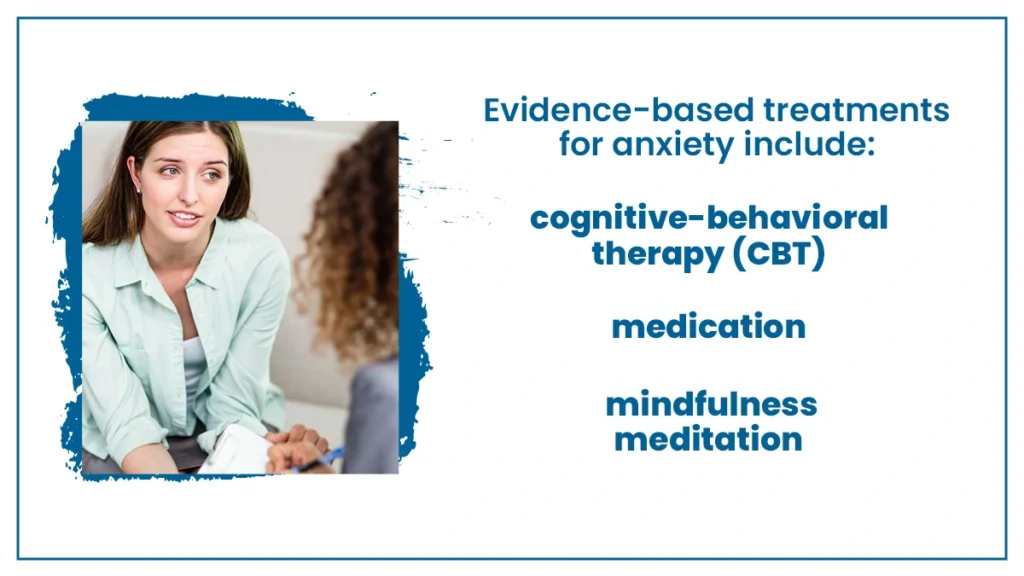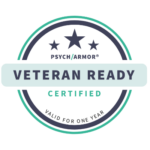Are you feeling anxious and looking for ways to find calm? Managing anxiety can be achievable with simple yet effective strategies. In this article, we’ll explore proven treatments and lifestyle changes to help reduce anxiety and promote well-being.
By incorporating these easy methods into your daily routine, you can better control your thoughts and emotions, leading to a happier and healthy life. So, let’s dive in and discover how to conquer anxiety once and for all!

Key Takeaways
Anxiety is a natural emotion, however it may be a disorder if it interferes with your daily life. Here is what you need to know about this condition:
- Several factors can lead to the onset of anxiety, such as stress, genetics, or substance use.
- There are many types of anxiety disorders with their own diagnostic criteria.
- Evidence-based treatments for anxiety include cognitive-behavioral therapy (CBT), medication, and mindfulness meditation.
- Lifestyle changes like regular exercise, good nutrition, and adequate sleep can help manage anxiety.
When anxiety leads to addiction, seeking help from an addiction treatment center like The Haven Detox-South Florida is essential. Contact us at (561) 328–8627 to learn more.
Understanding Anxiety
Anxiety is just one of the many emotions that we experience as human beings. It’s a feeling of fear, worry, or nervousness about something that might happen. For example, anxious feelings before a big test or public speaking are common and can even be helpful as it prepares us to perform well.
However, anxiety can become a problem when it starts interfering with our everyday life. When the feelings of worry or fear are intense, overwhelming, and last for a long time, it may turn into an anxiety disorder. This can hinder one’s ability to carry out routine activities such as attending school, going to work, or socializing with friends.
An anxiety disorder may also manifest with physical symptoms like a fast heartbeat, sweating, trembling, or dizziness. Sometimes, people may have trouble sleeping or concentrating due to their anxiety. They might also experience constant thoughts about the things they fear, which can make them feel even more anxious.
When someone has an anxiety disorder, seek help from a health professional. There are various treatments available, such as therapy and medication, that can be very effective in managing anxiety and improving the quality of life.
The Culprits Behind Anxiety: Common Causes Explored
Anxiety can be triggered by various factors that affect how we feel and react to certain situations. Understanding these common causes can help us manage and cope with anxiety better. Here are some of the most frequent reasons people may experience anxiety:
Stress: High stress levels from school, work, relationships, or other life challenges can result in anxiety.
Traumatic Events: Going through a traumatic experience, such as an accident or the loss of a loved one, can trigger anxiety symptoms.
Genetics: Anxiety can run in families. If someone has a close family member with anxiety, they may be more likely to experience it themselves.
Chemical Imbalance: Changes in brain chemicals, such as serotonin and dopamine, can contribute to anxiety.
Personality Traits: Some people are naturally more prone to anxiety due to their personality traits, like being overly perfectionistic or constantly worrying about things.
Medical Conditions: Chronic illnesses, hormonal imbalances, or chronic pain can be linked to anxiety.
Substance Use: Drugs, alcohol, or even excessive caffeine intake can worsen the symptoms of anxiety.
Phobias: Fear of specific objects or situations, like heights or spiders, can cause anxiety in certain contexts.
Life Changes: Major life transitions can also trigger anxiety, such as moving, changing jobs, or starting a new school.
Social Pressures: Feeling pressure to fit in or perform well in social situations can lead to anxiety.
Seek support and talk to someone if you or someone you know is struggling with anxiety. Understanding the underlying causes can be the first step toward managing anxiety effectively.
Know Your Anxiety: Recognizing the Different Types
Various mental health conditions fall under the umbrella of anxiety disorders, causing excessive worry, fear, and discomfort in people’s lives. Understanding the different types of anxiety disorders can help recognize their symptoms and seek appropriate support.
Here are some common anxiety disorders:
Generalized Anxiety Disorder (GAD)
Generalized anxiety disorder (GAD) involves constant and excessive worry about different aspects of life, such as work, health, or family, even when there is little or no reason for concern. People with GAD may find it challenging to control their anxiety, leading to physical symptoms like restlessness, fatigue, or muscle tension.
Panic Disorder
Panic disorder involves sudden, repetitive panic attacks, which trigger intense episodes of fear and discomfort. These attacks often come with physical symptoms like rapid heart rate, sweating, trembling, and a feeling of impending doom. Individuals with panic disorder may worry about future panic attacks and may even change their behavior to avoid triggering them.
Social Anxiety Disorder (Social Phobia)
Social anxiety disorder is defined by extreme fear or anxiety related to social situations. People with this disorder may feel excessively self-conscious and worry about being judged or embarrassed in social interactions. As a result, they may avoid social gatherings or situations that trigger their anxiety.
Specific Phobias
Specific phobias involve intense fear and avoidance of specific situations or objects, such as heights, flying, or spiders. The level of fear experienced is disproportionate to the actual threat posed by the phobic stimulus. Individuals with specific phobias may go to great lengths to avoid encountering the object of their fear.
Obsessive-Compulsive Disorder (OCD)
Obsessive-compulsive disorder (OCD) is characterized by intrusive, unwanted thoughts (obsessions) and repetitive behaviors (compulsions) performed to reduce anxiety. These obsessions and compulsions can consume a considerable amount of time, impacting daily activities.
Post-Traumatic Stress Disorder (PTSD)
Post-traumatic stress disorder (PTSD) can manifest after one has gone through or witnessed a traumatic event. It involves symptoms like flashbacks, nightmares, and severe anxiety related to the traumatic experience. People with PTSD may try to avoid reminders of the trauma and may feel emotionally numb.
Backed by Science: Effective Anxiety Treatments Options
When it comes to managing feelings of anxiety, several evidence-based treatments have proven effective in helping people find relief. Here are some scientifically-proven anxiety treatments:
Cognitive Behavioral Therapy (CBT)
Cognitive behavioral therapy (CBT) is a highly-regarded and effective treatment for various anxiety disorders. CBT helps individuals pinpoint and challenge negative thought patterns and irrational beliefs contributing to anxiety. Through this therapy, people learn healthier ways of thinking and develop coping strategies to manage anxiety-provoking situations.
Medication
Medication can be beneficial in managing anxiety disorders, especially when symptoms are severe. Antidepressants and anti-anxiety medication, such as SSRIs, are commonly used to alleviate anxiety symptoms. These medications work on brain chemicals that influence mood and can help alleviate the symptoms of anxiety.
Mindfulness Meditation
Mindfulness meditation, a relaxation technique, involves focusing on the present moment without judgment. It helps individuals become more aware of their thoughts and emotions, reducing reactivity to stress and anxiety triggers. Mindfulness practices, including deep breathing exercises and body scans, can promote relaxation and improve overall emotional well-being.
Exposure Therapy
Exposure therapy is a treatment specifically designed for phobias and certain anxiety disorders. It involves gradual and controlled exposure to the feared stimuli or situations, allowing individuals to confront and manage their anxieties. Over time, repeated exposure can desensitize the person to the triggers, leading to reduced anxiety responses.
Relaxation Techniques
Various relaxation techniques, like progressive muscle relaxation and guided imagery, can help reduce anxious thoughts and promote a sense of calm. Practicing these techniques regularly can enhance emotional resilience and improve overall mental well-being.
Tranquil Living: Lifestyle Changes to Curb Anxiety
In addition to professional treatments, certain lifestyle changes can significantly contribute to managing anxiety and improving overall mental well-being. Here are some beneficial lifestyle changes:
Exercise and Physical Activity
Regular physical activity is a potent tool for reducing anxiety. Exercise releases endorphins, the “feel-good chemicals,” which can boost your mood and help you feel more relaxed. Activities like walking, jogging, yoga, or dancing are excellent options. Set a goal of engaging in moderate physical activity for 30 minutes most days of the week.
Good Nutrition
Opt for a balanced diet comprising fruits, veggies, lean proteins, whole grains, and healthy fats. Avoid excessive use of sugary and processed foods, as they can exacerbate anxiety symptoms. Maintaining stable blood sugar levels through proper nutrition can promote stable moods and sustained energy.
Appropriate Sleep
Adequate and restful sleep is vital for managing anxiety. Create a relaxing bedtime routine, minimize screen time before bed, and ensure your sleeping environment is comfortable and conducive to rest. Aim for 7-9 hours of sleep each night to support your body’s natural recovery and stress management processes.
Limiting Caffeine and Alcohol
Caffeine and alcohol can worsen anxiety symptoms for some individuals. High caffeine intake can increase heart rate and jitteriness, while alcohol may temporarily alleviate anxiety but can ultimately exacerbate it. Moderation or reducing consumption of these substances can positively affect anxiety levels.
Social Support
Nurturing healthy relationships and seeking support from loved ones can significantly impact anxiety management. Share your feelings and concerns with trusted friends or family members, and consider joining mental health support groups to connect with those experiencing similar challenges.
Frequently Asked Questions (FAQ)
What relieves anxiety fast?
To relieve anxiety quickly, try deep breathing exercises, such as inhaling deeply for a count of four, holding for four, and exhaling for four. This helps calm the nervous system and provides immediate relaxation. Taking short walks in nature, listening to calming music, or talking to a supportive friend can also help ease anxiety fast.
What are the 5 techniques used for coping with anxiety?
To cope with anxiety, try these five techniques:
Practice deep breath exercises for relaxation.
Engage in physical activity to release stress.
Use mindfulness meditation to stay present and calm.
Challenge negative thoughts with positive affirmations.
Seek support from friends, family, or professionals.
Incorporating these techniques into your daily routine can reduce anxiety and improve your mood.
What are good coping skills for anxiety?
Good coping skills for anxiety include deep breathing exercises to relax, mindfulness techniques to stay grounded, engaging in hobbies to distract the mind, seeking support from friends or family, and talking to a professional for guidance.
Find Refuge and Renewal at The Haven Detox-South Florida
Anxiety is a complex mental issue that can drive people to seek relief from drugs or alcohol, leading to addiction. If your anxiety has led you to use drugs or alcohol as a way to cope, know that you are not alone. The Haven Detox-South Florida is here with open arms to support you on your journey to healing.
Our medical detox program is designed to help your body safely and gently rid itself of harmful substances. After detox, we offer a comprehensive residential treatment program where you’ll receive 24/7 medical care to address the root causes of addiction and anxiety. Don’t wait for things to get worse; we’re here to help you turn things around. Call us today at (561) 328–8627. Together, we’ll overcome this challenge and rediscover hope.






